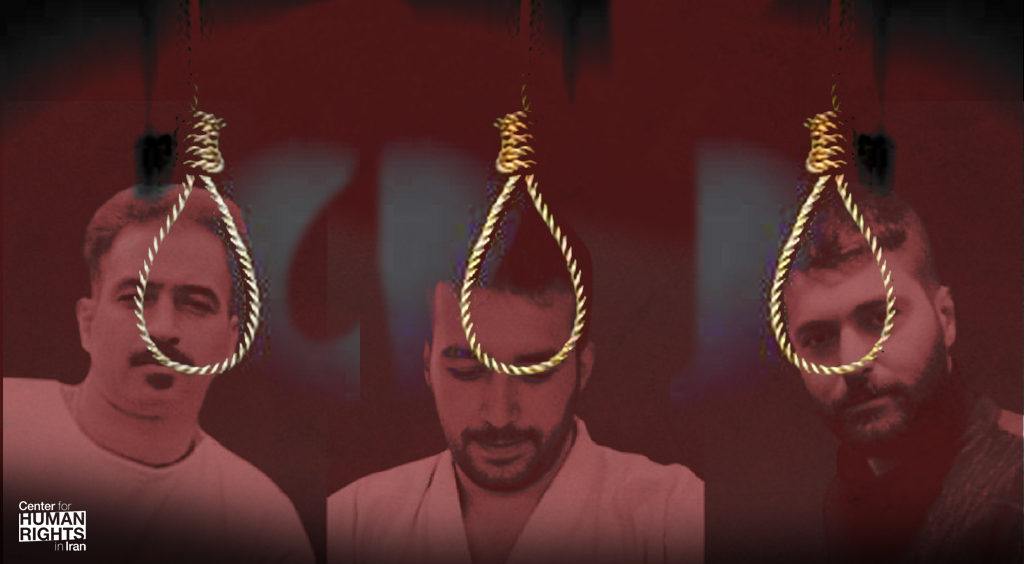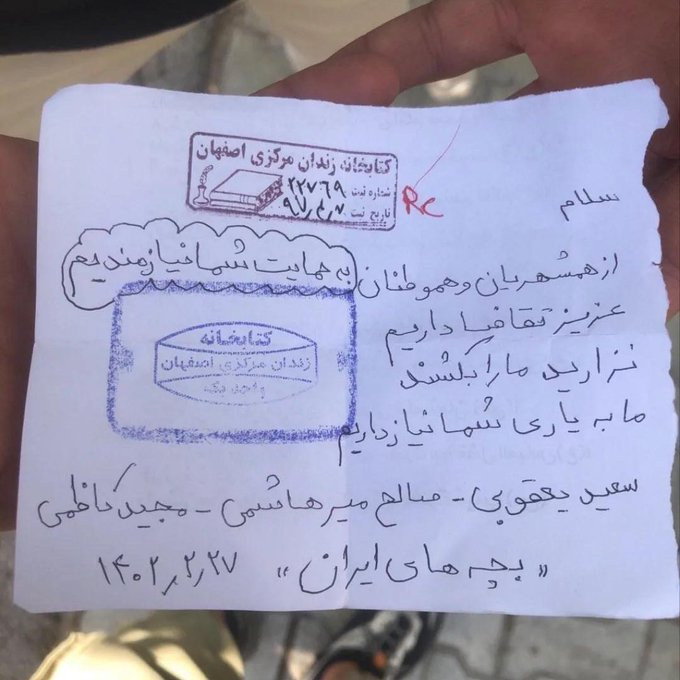
Prosecution of Three Young Men Relied on Torture, Forced “Confessions”
Defendant: “They kept beating me to make me tell their version of their crime on camera”
May 17, 2023 – Three young men—Saeed Yaghoubi, 37, Saleh Mirhashemi, 36, and Majid Kazemi, 30— who were arrested amid the nationwide protests in November 2022 in Iran, tortured into making “confessions,” and sentenced to death in January 2023 after a four-day trial without a jury in Iran’s Revolutionary Court system, are now at imminent risk of being executed.
“Three tortured protesters could be hanged at any moment—after a trial in which they were denied the ability to prepare a proper defense, the prosecution relied on forced ‘confessions,’ and the indictment was riddled with irregularities that reveal this was a politically motivated case,” said Hadi Ghaemi, executive director of the Center for Human Rights in Iran (CHRI).
“The international community—governments worldwide, UN leaders, human rights organizations, and international legal associations—must come together to demand a halt to the executions of these three young men before it is too late,” Ghaemi said.
Ghaemi noted that countless other prisoners in Iran, many of whom are ethnic minorities, are also at risk of execution for drug crimes, which do not meet international standards that prohibit the death penalty for all but the “most serious crimes,” which do not include drug offenses.
“These individuals are unknown outside their communities and in urgent need of international recognition,” Ghaemi said. “Countries that have abolished the death penalty, in the EU, South America and elsewhere, should urgently call on the Islamic Republic to halt its state-sanctioned killing rampage, which has surged since anti-state protests began in September 2022.”
Torture, No Evidence, No Independent Defense Counsel
Protesters who had gathered outside Iran’s central Isfahan prison (also known as Dastgerd prison) where the three men have been imprisoned were met with gunfire from state security forces during the evening of May 14 as they shouted “No more executions!”
The three men were charged with killing a police officer and two Basij militiamen, but the prosecution’s only “evidence” was taped, forced “confessions” obtained under torture in which the men make self-incriminating statements as well as against each other.
Torture, forced self-incriminating statements, and confessions used as evidence against other defendants in court are all illegal under both Iranian and international law.
 “We demand to see evidence,” said Majid Kazemi’s sister in an interview with the Shargh newspaper. “They should present evidence that shows my brother was present at the time of the murder. The only evidence in this case is statements by others; one says I heard from someone that it was Majid, and another says that Bahmani told us that Majid was there.”
“We demand to see evidence,” said Majid Kazemi’s sister in an interview with the Shargh newspaper. “They should present evidence that shows my brother was present at the time of the murder. The only evidence in this case is statements by others; one says I heard from someone that it was Majid, and another says that Bahmani told us that Majid was there.”
“We don’t intend to cause trouble,” she added. “We are neither against the supreme leadership [Iranian government] nor anyone else. We just don’t want our brother’s blood to be unjustly spilled.”
None of the defendants were allowed to choose their own lawyer. Instead, as in all so-called “national security” cases in the Islamic Republic, they were forced to use state-approved, court-appointed lawyers, in a trial that lasted four days.
In addition, the verdict contained serious inconsistencies regarding the complainant that violate the Islamic Republic’s own judicial procedures, explained Saeid Dehghan, an Iranian human rights lawyer. The charges included “Enmity against God” (moharebeh), where the complainant is the state, but the indictment also referred to qisas, where the complainant is a private individual or family.
Dehghan added that conflicting, unlawful charges were also used in the wrongful conviction and execution of champion wrestler Navid Afkari in 2020, reflecting a judicial system in the Islamic Republic that not only violates all international standards of due process and fair trials, but also its own laws.
Iranian law requires trials that involve gun crimes to include gun experts, but no gun experts testified at the three men’s trial, added Dehghan, who noted that the judge himself acted as the gun expert. Lastly, the verdict is unclear regarding who allegedly used the gun or who allegedly murdered whom.
Defendant Described Horrific Torture
In a phone call with a relative, Kazemi described his torture:
In court, I said that I don’t accept any of these charges, I don’t accept anything that I said [under torture]. They tortured me and used a Taser on me. They were killing me.
They flogged the soles of my feet. They took me to a place where there were no cameras and told me to drop my pants. They said they would shove a baton up my anus. I begged them not to, that I would accept all the charges.
Kazemi also noted that camera footage at his workplace proves he wasn’t there at the time of the crime, and that his interrogators tried to pin the weapon on him even though he doesn’t own a gun.
He added:
They couldn’t arrest those who did it. They told me, ‘Is this your Colt?’ I said no. They beat me and I said it’s mine. They said, “You fired shots with it, right?’ I said no. They beat me and said they would hang my brothers Hossein and Mehdi and bother my mother in the hospital and I said charge me with anything you want but don’t do anything to my family. I was under constant torture. I was at work until 8.30 at night… I’m not in any group. I have my own copper shop and I don’t have any criminal record. What group? What political party? What kind of story is this? They can go and get statements from people in the neighborhood. My shop is still there and they can check the cameras that I was there until 8.30 at night…
“We demand to see evidence,” said Majid Kazemi’s sister in an interview with the Shargh newspaper. “They should present evidence that shows my brother was present at the time of the murder. The only evidence in this case is statements by others; one says I heard from someone that it was Majid, and another says that Bahmani told us that Majid was there.”
“We don’t intend to cause trouble,” she added. “We are neither against the supreme leadership [Iranian government] nor anyone else. We just don’t want our brother’s blood to be unjustly spilled.”
None of the defendants were allowed to choose their own lawyer. Instead, as in all so-called “national security” cases in the Islamic Republic, they were forced to use state-approved, court-appointed lawyers, in a trial that lasted four days.
In addition, the verdict contained serious inconsistencies regarding the complainant that violate the Islamic Republic’s own judicial procedures, explained Saeid Dehghan, an Iranian human rights lawyer. The charges included “Enmity against God” (moharebeh), where the complainant is the state, but the indictment also referred to qisas, where the complainant is a private individual or family.
Dehghan added that conflicting, unlawful charges were also used in the wrongful conviction and execution of champion wrestler Navid Afkari in 2020, reflecting a judicial system in the Islamic Republic that not only violates all international standards of due process and fair trials, but also its own laws.
Iranian law requires trials that involve gun crimes to include gun experts, but no gun experts testified at the three men’s trial, added Dehghan, who noted that the judge himself acted as the gun expert. Lastly, the verdict is unclear regarding who allegedly used the gun or who allegedly murdered whom.
Defendant Described Horrific Torture
In a phone call with a relative, Kazemi described his torture:
In court, I said that I don’t accept any of these charges, I don’t accept anything that I said [under torture]. They tortured me and used a Taser on me. They were killing me.
They flogged the soles of my feet. They took me to a place where there were no cameras and told me to drop my pants. They said they would shove a baton up my anus. I begged them not to, that I would accept all the charges.
Kazemi also noted that camera footage at his workplace proves he wasn’t there at the time of the crime, and that his interrogators tried to pin the weapon on him even though he doesn’t own a gun.
He added:
They couldn’t arrest those who did it. They told me, ‘Is this your Colt?’ I said no. They beat me and I said it’s mine. They said, “You fired shots with it, right?’ I said no. They beat me and said they would hang my brothers Hossein and Mehdi and bother my mother in the hospital and I said charge me with anything you want but don’t do anything to my family. I was under constant torture. I was at work until 8.30 at night… I’m not in any group. I have my own copper shop and I don’t have any criminal record. What group? What political party? What kind of story is this? They can go and get statements from people in the neighborhood. My shop is still there and they can check the cameras that I was there until 8.30 at night…
n another recorded phone call from January 2023, co-defendant Saleh Mirhashemi, a karate champion, told his mother, “I asked the mullah where the gun was, I did not even have a firecracker with me.”
Despite all this, the men were sentenced to death with no chance of an appeal.
Executions Soaring in Iran
Recorded executions in Iran soared from 314 in 2021 to 576 in 2022, according to Amnesty International.
At least 231 people have been executed in Iran since January 2023, according to research by CHRI, including two street protesters: Mohammad Mehdi Karami, 22, and Seyed Mohammad Hosseini, 39, in January 2023.
Two other street protesters, Moshen Shekari and Majidreza Rahnavard, both 23-years-old, were hanged in December 2022.
All the trials of the street protesters have been marked with egregious denials of due process, including the ability to choose one’s lawyer, as well as the chance to prepare and present a proper defense.
UN Human Rights Chief Volker Türk called on the authorities in Iran to “halt all executions” and “abolish the death penalty,” in a statement on May 9, 2023, stating that over 10 people are being put to death each week in Iran, making it “one the world’s highest executors.”
